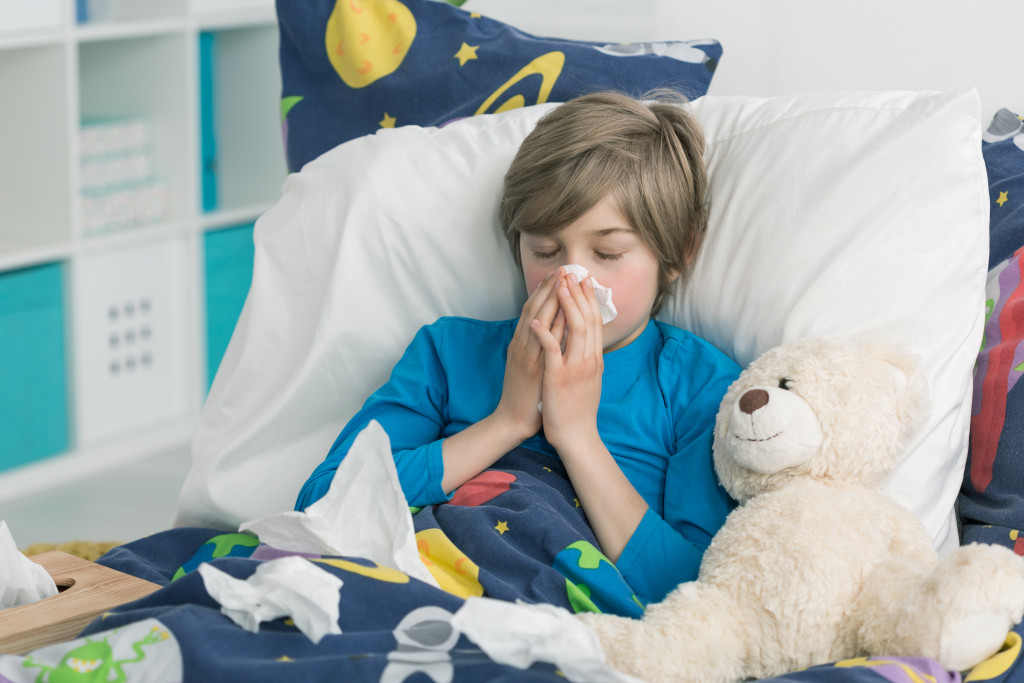It’s no fun when your child has a stuffy nose. It is uncomfortable for them and can make it harder for them to sleep, eat, and breathe. If your child is dealing with nasal congestion, you likely have many questions. What’s causing this? How can I treat it? And most importantly, how can I prevent it? Keep reading to get answers to all of your questions about nasal congestion in children.
What is Nasal Congestion?
Often when our little ones are down with a cold, the first sign is congestion. A stuffy or runny nose is pretty easy to spot. But what exactly is nasal congestion? In short, the sinuses and nasal passages become inflamed, and your child can’t breathe through their nose properly.
This inflammation can happen for several reasons, like allergies and colds. Unfortunately, a congested nose is a very unpleasant experience for children. They tend to be cranky and fussy, which makes it even more difficult for them (and you!) to get through the day. This is because it’s hard to eat, sleep, and breathe with a blocked nose. It even gets worse when they try to lie down, as the congestion often gets worse when they’re in a horizontal position.
Causes of Nasal Congestion in Children
There are a few different things that can cause nasal congestion in children, including the following:
- Common cold- This is the most common cause of nasal congestion in children. It’s caused by a virus and can be spread through contact with other people who are sick or contact with objects they’ve touched.
- Allergies- If your child has allergies, like hay fever, they may experience nasal congestion. Allergens such as pollen, pet dander, and dust mites can trigger nasal congestion in children with allergies.
- Nasal polyps- These are noncancerous growths in the nose that can block the airways and cause difficulty breathing. Nasal polyps are more common in adults but can also occur in children.
Treatments for Nasal Congestion in Children
You can do a few things at home to help relieve your child’s nasal congestion. Of course, the rule of thumb is always to consult a doctor before beginning treatments. A reputable pediatric allergy doctor can provide advice on the best treatment plan for your child, mainly if allergies cause nasal congestion.
However, you can do a few things at home to help relieve your child’s nasal congestion. These include using saline drops or sprays to loosen the mucus, having them drink plenty of fluids to stay hydrated, using a humidifier to keep the air moist, and elevating their head when they sleep so that the mucus can drain more easily. If your child is over the age of four and having trouble breathing through their nose, you can give them over-the-counter medication like ibuprofen or acetaminophen to help relieve pain and reduce inflammation.
Also, a cool-mist humidifier in their bedroom can help keep the air moist, making it easier for them to breathe. Always speak with a doctor before giving any medication to your child.
Prevention of Nasal Congestion in Children

There are some things you can do to help prevent your child from getting nasal congestion in the first place. One of the best ways to avoid nasal congestion is to keep your child away from irritants that can cause swelling of the blood vessels in the nose. If your child is allergic to something, avoid exposure to that allergen as much as possible. Common allergens include pollen, pet dander, dust mites, mold, and certain foods. If your child isn’t allergic to anything but still gets congested often, try keeping them away from cigarette smoke, perfumes, cleaning products, and other strong smells.
Another way to prevent nasal congestion is to have your child take a daily antihistamine such as cetirizine (Zyrtec) or fexofenadine (Allegra). These medications help to reduce swelling in the blood vessels and will prevent your child from getting congested in the first place. If your child does start to get congested, you can also use a nasal spray such as fluticasone (Flonase) or a decongestant such as pseudoephedrine (Sudafed) to help clear their nose. Just be sure not to use topical decongestants for more than 3 days in a row, as they can make congestion worse if used for too long.
The bottom line
As a parent, being aware of the causes of nasal congestion in children, as well as how to treat and prevent it, is key. Make sure you speak to your child’s doctor if they have any concerns or questions about their nasal congestion. Taking these steps can help ensure that your child stays healthy and happy.
